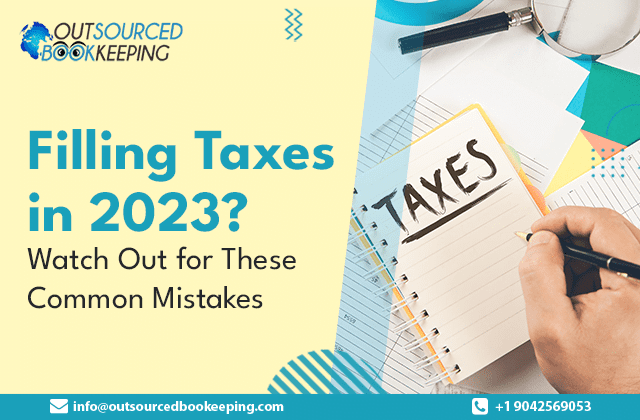As the tax season of 2023 is approaching, taxpayers must be aware of common errors that they may make when filling taxes returns, which can lead to penalties and unwanted troubles. Filing taxes can seem overwhelming, and errors are common. Therefore, it’s crucial to be cautious and vigilant to avoid making such mistakes. Below are some common errors that taxpayers should be careful about when filing their taxes in 2023.

Filing Status Errors
When filing taxes, taxpayers often make mistakes by selecting the wrong filing status. The filing status you choose determines your tax rate, eligibility for specific tax credits, and standard deduction. There are five different filing statuses available. Picking the wrong filing status can result in overpaying for underpaying taxes.
If you’re married but file as single, you may lose tax benefits like deducting your spouse’s IRA contributions. Similarly, a single parent filing as single instead of head of household may miss a higher standard deduction and other benefits.
Mathematical Errors
People commonly make mistakes in their tax calculations which can lead to incorrect tax bills. These mistakes can range from simple arithmetic errors such as adding or subtracting incorrectly, to forgetting to transfer a number, but even small mistakes can lead to problems. The IRS will send you a notice and you may be responsible for additional taxes, penalties, and interest.
With AP automation, reduction in the amount of time spent on manual data entry and processing invoices. To prevent mathematical errors, it is advisable to double-check all calculations and ensure that numbers are entered correctly. Although tax preparation software often catches mathematical errors, it is still important to carefully examine your return before submitting it.
Forgetting to Include the Income
Like payroll mistakes, taxpayers often omit income, especially with multiple sources like self-employment, investments, or a second job. They may also overlook short-term rental or gig earnings. The IRS receives copies of all income-related documents, including W-2s and 1099s.
Thus, if a taxpayer misses any income, the IRS will know. The consequence of failing to report all income can result in penalties and interest on unpaid taxes. To avoid this, taxpayers should ensure that they gather all income forms before filing their tax returns and double-check to confirm that they have reported all income.
Not Taking Advantage of Deductions and Credits
Many taxpayers fail to utilize deductions and credits they are qualified for, which is a common mistake. Deductions decrease the amount of taxable income while credits reduce tax liabilities directly. Various deductions and credits are accessible, such as those for charitable donations, education expenditures, student loan interest, and childcare expenses.
To profit from deductions and credits, keep track of all your expenses throughout the year. If you are unsure which deductions and credits you qualify for, seek advice from a tax professional or utilize tax preparation software that can assist you in identifying them. You can opt for outsourced accounting services for more help.
Missing the Deadline
Failure to meet the tax deadline is a prevalent mistake that can lead to fines and interest on outstanding taxes. Most taxpayers need to file their tax returns by April 15, 2023. If you can’t meet the deadline, you may request an extension that will allow you six more months to file your return.
However, it’s crucial to note that an extension only provides more time to file your return, not to pay any taxes owed. If you don’t pay taxes owed by the deadline, you’ll still face penalties and interest on the unpaid taxes.
To avoid missing the deadline, it’s vital to start preparing your return early and set reminders to file by the deadline. If you’re having difficulty obtaining all the necessary documents, contact your employer or financial institution as soon as possible. Or you can opt for professional bookkeeping and accounting services.
If you find yourself overwhelmed or uncertain about the tax filing process, it’s worth considering partnering with a professional accounting firm such as Outsourced Bookkeeping. Their team of experts can assist you through the tax filing process and help you avoid common mistakes that may result in costly errors.
Outsourced Bookkeeping provides a wide range of services to help you handle your finances, including bookkeeping, accounting, tax planning, and preparation. With their proficiency and customized approach, you can trust that your finances are in reliable hands.








